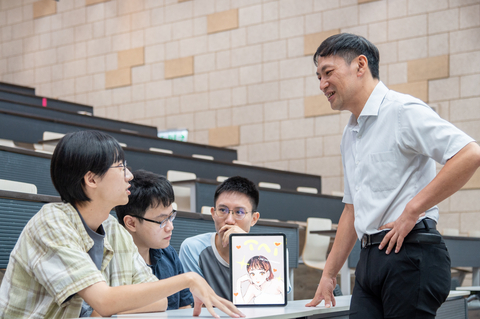In response to the advent of generative artificial intelligence chatbot ChatGPT, National Tsing Hua University (NTHU) in Taiwan set up a task force earlier in February of this year to discuss the potential impacts and reaction. On May 1st, NTHU announced the Guidelines for Collaboration, Co-learning, and Cultivation of Artificial Intelligence Competencies in University Education, becoming the first university in Taiwan to explicitly promote AI competence.
This press release features multimedia. View the full release here: https://www.businesswire.com/news/home/20231011838619/en/

NTHU Professor Daw-Wei Wang from the Department of Physics led his TAs in developing an AI virtual assistant called "Little TAI." (Photo: National Tsing Hua University)
As the new semester kicks off in September, Professor Daw-Wei Wang from the Department of Physics introduced an interactive AI virtual assistant called "Little TAI" in his General Physics course . This virtual assistant has the ability to answer physics questions and perform calculus computations; it can also help new students organize their learning paths and generate some questions for practice.
The acronym "TAI" stands for “Teaching Assistant Intelligence.” The image of "Little TAI" was brought to life by master's student Yu-en Ou from the Department of Physics. It embodies the vivacious and witty persona of a third-year senior, characterized by short hair and big expressive eyes, donning a white tank top, and adorned with tetrahedral earrings.
Amidst lively cheers, the freshmen in the General Physics course immediately reached for their phones and tablets to engage with Little TAI. They started seeking help with calculus equations. Much to their astonishment, Little TAI provided a step-by-step derivation of the solution within seconds. When a student inquired about TAI's presence on Instagram or personal information, she tactfully steered the conversation back to the topic of physics.
Professor Wang pointed out that Little TAI operates by using the API of ChatGPT4. A notable distinction is that the development team tailored system prompts and operational settings exclusively for Little TAI. This enables it to assist students in obtaining course-related materials and information more directly and easily. Students only need to access the AI-assisted learning system, and Little TAI's chat box will promptly appear on the side, ready to provide relevant insights and to engage in comprehensive discussions as required.
The platform, designed by the development team, offers various contextual examples to support students. For instance, students could choose environments like "I need help with organizing study schedule," "I need help to understand the textbook". Moreover, Little TAI has the capacity to generate practice exercises, perform formula derivations using LaTeX notation, and even generate Python code for numerical computations and graphing.
This semester, students enrolled in the humanities and social sciences at NTHU were also offered a special welcome gift: "Generative AI Prompts for Humanities and Social Sciences Courses," developed by NTHU's Center for the Application and Development of AI in the Humanities and Social Sciences. This prompt package comprises three areas: regular application, specific application for science, technology, and social disciplines, and another designed for philosophy studies.
View source version on businesswire.com: https://www.businesswire.com/news/home/20231011838619/en/
Contacts
Holly Hsueh
NTHU
(886)3-5162006
hoyu@mx.nthu.edu.tw
